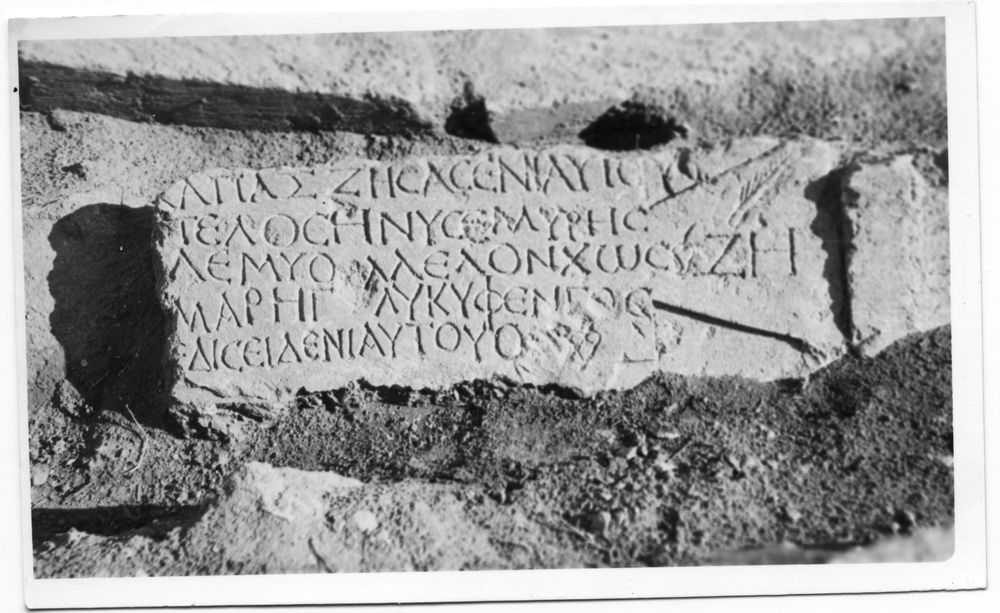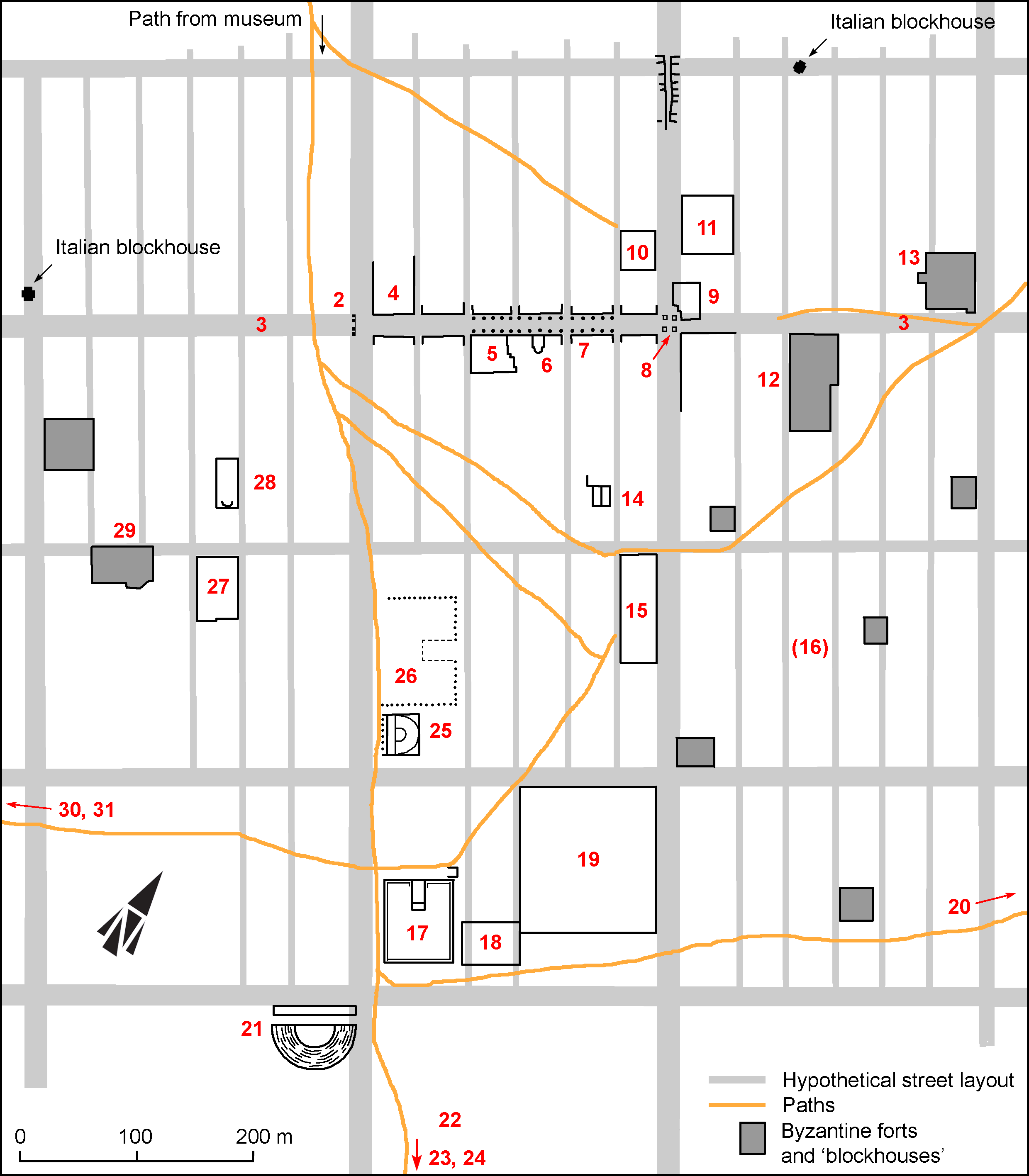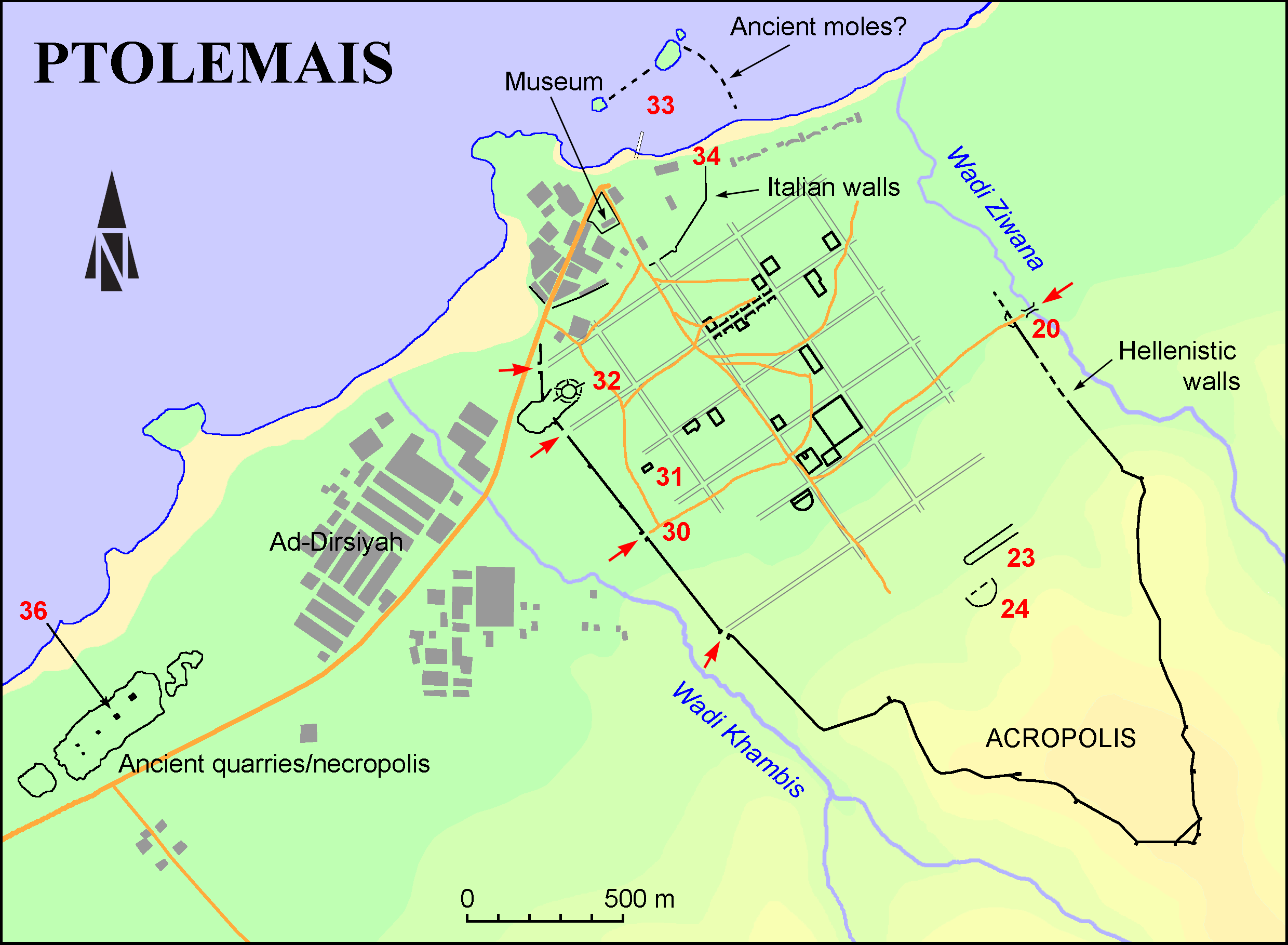EpiDoc XML:
GVCyr0472
Trismegistos ID:
738937
Source description
Support: Limestone block, cut off on the left or belonging to a larger monument (w: 0.90 × h: 0.32 × d: depth not measured).
Layout: Inscribed on one face, inside a tabella ansata, only the upper right part of which survives; a palm branch is cut inside the upper ansa. Another inscription (text b) is cut outside the tabella in correspondance with line 3.
Letters: Text a, line 1: 0.05; other lines: 0.04; text b: 0.08; slight serifs; lunate epsilon, xi with central zigzag; lower lambda with the right stroke protruding above the left one; lunate sigma, cursive omega.
Date: Third century AD or later (lettering).
Findspot: Found in 1935 at Ptolemais ➚: East Necropolis, first recorded in 1935, as from the so-called Hellenistic tomb. Lying with the debris of a fallen mausoleum just east of the City Wall, on the West bank of the Wadi Ziwana, near the bridge.
Place of origin: Probably near findspot.
Last recorded location: Seen and photographed by J.M. Reynolds at Ţulmaythah: in the Tolmeita Museum, at an unknown date. Not seen by GVCyr team.
Text constituted from: Transcription from photograph and J.M. Reynolds' notes (CDL).
Bibliography
Dobias-Lalou 2017, pp. 191-204 (ph.) and GVCyr 047 ➚, whence SEG 67.1499.
Text
| [ ˉ ˘ ˘ | ˉ ˘ ˘ ] (εἴκοσ᾿) ἅπαξ ζήσας ἐνιαυτοὺς
| [ἐνθάδε? κεῖται ˉ ˘ ˘ ὃς] τέλος ἤνυσε μύρης
| [ ˉ ˘ ˘ | ˉ ˘ ˘ ἐκ πο]λέμ⸢ου⸣ (τριάκοντα) λελονχώς ❧.
| [ ˉ ˘ ˘ | ˉ ˘ ˘ | ˉ κεῖται δά]μαρ ἣ γλυκὺ φένγος
5 | (5) (vac. 3) [ἡελίοιο (ἐείκοσι)?] (πέντε) δὶς εἶδ' ἐνιαυτού⸢ς⸣ ❧ (vac. 2)
a.3 ⸢ου⸣ lapis υο (sic) | a.5 ⸢ς⸣ lapis ο (sic)
Apparatus
1: (εἴκοσ') ἅπαξ: (ἐείκοσ') ἅπαξ ΚΑΠΑΞ on the stone
3: (τριάκοντα) λελονχώς ΛΛΕΛΟΝΧΩΣ on the stone
5: [(ἐείκοσι)] (πέντε) δὶς [.]ΕΔΙΣ on the stone
French translation
a) [---], ayant vécu une fois 20 ans, [repose ici, lui qui] a accompli jusqu'au bout sa destinée, [---] ayant reçu de la guerre pour lot 30 [---].
[--- repose] son épouse, qui a vu la douce lumière [du soleil] pendant deux fois [2?]5 années.
b) Il (elle) vit !
English translation
a) [---], having lived once 20 years, [rests here, who] fully accomplished his destiny, [---] having received as his lot from war 30 [---].
[--- rests] his wife, who saw the gentle light [of sun] for twice [2?]5 years.
b) He (she) is alive!
Italian translation
a) [---], avendo vissuto una volta 20 anni, [riposa qui, lui che] ha condotto completamente a termine il suo destino, [---] avendo avuto in sorte dalla guerra 30 [---].
[--- riposa] sua moglie, che ha visto la dolce luce [del sole] per due volte [2?]5 anni.
b) Vive!
Commentary
We follow the date cautiously suggested by J.M. Reynolds. However, it should be noted that the reading μύρης for μοίρης would show a rather later date. The same phonetic change might suggest to read at line 3 ΠΟΛΕΜΥΟ as πολέμοιο. However this would not fit the rhythm of the following word. So we prefer to interpret this form as the classical one with the erroneous spelling of two inverted letters.
An oddity of this verse inscription consists in numerals of the alphabetic system being cut instead of the respective words that should be spelt out at lines 1, 3 (and thus 5). Together with the opposition between ἅπαξ 'once' at line 1 and δίς 'twice' at line 5, it may be described as a sort of mathematical enigma. At line 5 the numeral ending with ε (meaning 5) should match the rhythm and, once doubled, give a plausible age for the widow who outlived her husband. The only possibility meeting all the requests is 25.
The numeral 30 at line 3 does not indicate an age, but something obtained from war by this young man: was he wounded 30 times? Or victorious 30 times? Did he lead 30 men? It would be hazardous to choose between such guesses.
All supplements are C. Dobias-Lalou's, who did not keep some suggestions communicated privately by W. Peek to J.M. Reynolds, for neither of those scholars did recognize the spelling of the numbers.
The names of the dead man and woman were plausibly lost in the gaps of lines 2 and 4.
Metrical analysis: five dactylic hexameters.
CC BY-NC-SA 4.0 Deed Attribution-NonCommercial-ShareAlike 4.0 International License.
All citation, reuse or distribution of this work must contain a link back to DOI: https://doi.org/10.60760/unibo/igcyrgvcyr2 and the filename (IGCyr000000 or GVCyr000), as well as the year of consultation.


